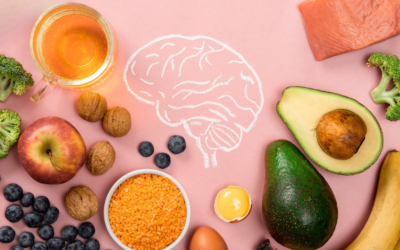Have you ever noticed when you are experiencing a particular feeling or mood you reach for food? It might be grabbing something sweet such as chocolate when you are feeling down or stressed. Whilst a treat occasionally is normal and part of a balanced diet, relying on refined, processed food all the time can have a negative impact on our health including our brain. In fact, a high intake of refined, processed foods has been linked to impaired brain function including low mood, poor concentration, and depression.
Studies have compared the western diet to more traditional diets including the Mediterranean and Japanese Okinawan diet and found the risk of depression is 25-35% lower in those who eat a more traditional diet. What is the difference? A more traditional type of diet is based on vegetables, fruit, unprocessed wholegrains, legumes, fish and seafood, small amounts of lean protein and dairy and minimal processed, refined foods.
What are some easy ways to include nutrient dense whole foods in our diet to sustain our mood?
Here are our top five 5 mood boosting foods:
- Omega-3 rich fish: Your brain’s best friend
We know that our brain holds the key to regulating our emotions and mood, but did you know 60% of our brain and nervous system is composed of fat? This fat-rich network plays a crucial role in maintaining optimal brain function, and ultimately our mood. Fuelling our brain and nervous system with omega-3 fats is the best way to help the nervous system avoid slowing down and continue to help regulate our mood. In fact, research has found that low levels of omega-3 fats are linked to depressed mood, hostility, and impulsive behaviour. The best sources of omega 3 come from oily salmon, tuna, sardines, mackerel, and herring and it is recommended to include 2-3 times a week.
Ideas: Add some omega-3 rich fish to pasta , the barbecue or a quick salad and know that you’re nourishing your brain and uplifting your mood with every bite.
- Nuts: Tiny powerhouses for your mood and mind
Nuts provide a host of benefits for both the brain and mood. Packed with nutrients like healthy fats, antioxidants, and essential vitamins, nuts offer a natural boost to brain function. Additionally, nuts contain mood-enhancing compounds like serotonin and magnesium, which can help regulate mood and promote a sense of well-being.
Ideas: Include some raw nuts as snack or even try our hot spiced nuts . One serve of raw nuts = 30g (1/4 cup). Nuts also make a great addition to dishes including Granola, smoothies, salads, soup, stir fries and curries.
- Legumes: Protein-packed mood elevators
Legumes, such as lentils, chickpeas, and kidney beans are not only excellent sources of plant-based protein but also low GI powerhouses. These versatile foods are packed with essential nutrients including folate, magnesium, and iron, which play a crucial role in maintaining mood balance.
Ideas: Add legumes to soups, salads, casseroles, and dips. Try our tangy lentil soup with silverbeet and zucchini, whip up some hummus for a nutritious snack, or create this delicious Mediterranean vegetable and cannellini bean salad to keep your spirits high all year round!
- Berries: Bursting with goodness and antioxidants
Berries such as blueberries, strawberries and raspberries are rich in vitamin C and anthocyanins, which have been linked to improved mood and cognitive function.
Ideas: Snack on a handful of berries, blend them into a smoothie, or top your yoghurt or oats with a colourful medley of these nutrient powerhouses to uplift your mood.
- Oats
Starting your mornings with a nourishing bowl of porridge or granola and you will be guaranteed to kick-start your day on a positive note. Oats have a low GI value, meaning they provide a sustained release of energy and help keep your blood sugar levels stable. They are also rich in tryptophan, an amino acid essential for serotonin production. Try overnight oats topped with mood-boosting fruits like berries, or sprinkle a handful of nuts for added crunch and healthy fats.
The foods we eat play a significant role in our well-being, and when it comes to regulating our mood, choosing low glycemic index (GI) foods is key. Remember, a balanced diet is just one aspect of maintaining mental well-being. There are so many other factors that play a key role in mood management including hydration, adequate sleep, managing stress, regular physical activity, prioritising self-care and seek professional guidance if needed.


